Congressman Kennedy Meets Young Leaders of My Life My Choice
By Congressman Joe Kennedy III
One of the most important parts of my job as a federal representative is understanding how the policy we craft in Washington shapes the lives of people back home. Earlier this year, Congress passed an important piece of legislation called the Justice for Victims of Trafficking Act (or JVTA) which will help hold offenders accountable, provide funding for prevention and education, and establish a Domestic Trafficking Victims’ Fund supported by the fines collected from traffickers.
I was proud to support that bill and believe it makes some critical reforms. But hearing directly from the young women in My Life My Choice’s Leadership Corps a few weeks ago gave me an entirely new perspective on the importance of legislation like the JVTA – and a sense of the work we have left to do to truly tackle commercial sexual exploitation.
From the moment they walked into my office, I was struck by their poise. They eloquently shared their perspective and confidently told me what they believed the federal government could do better to support victims of commercial sex trafficking. And they made it clear that an essential part of addressing commercial sexual exploitation is doing away with the idea that there is any kind of “typical” victim. The girls sitting in my office that day were from different backgrounds, different ethnicities, different families and different communities across the Commonwealth. Some had been victimized as very young girls; some in their later teenage years.
One powerful thing they have in common? They are survivors. Unfortunately, that makes them the exception, not the rule.
Despite their breadth of experiences, stereotypes about this country’s commercial sex trade persist with images of women walking street corners and approaching cars slowly rolling by. But today 94% of sex trafficking is conducted through a third party – often on the internet. That means that most of the girls My Life My Choice serves were “pimped” out by people they knew: friends, community leaders and even family members.
This rush to stereotype the commercial sex industry and its victims leads to a lopsided system of justice that inherently places victims at a disadvantage. Too often, the women are labelled as criminals and publicly humiliated, while the procurers (usually male) pay a minimal fine and walk away quietly. As a former public prosecutor, this is an imbalance I witnessed too often.
That’s why we need to support legislation like the JVTA, which ensures public policy puts victims first. And why we must do more moving forward. We need to do away with preconceived notions about who and where commercial sexual exploitation strikes. We need to look at buyers and traffickers as criminals and treat them as such. Law enforcement and first responders must receive the proper training to identify victims and get them the help they desperately need. Proper funding must be allocated for prevention and education.
As we address those priorities, it’s hard to overstate the importance of having an organization like My Life My Choice provide young victims with a safe space to find their voice. My Life My Choice empowers women who have been made to feel helpless and gives them the critical tools to grow and thrive outside the commercial sex industry. As one young woman, 17, told me, “Yes, we have been victimized, but [because of My Life My Choice] we are not victims anymore.” Whether helping them gain crucial job skills or giving them the confidence boost they need to apply to college, My Life My Choice is a model organization that I’m proud to partner with.
Despite their breadth of experiences, stereotypes about this country’s commercial sex trade persist with images of women walking street corners and approaching cars slowly rolling by. But today 94% of sex trafficking is conducted through a third party – often on the internet. That means that most of the girls My Life My Choice serves were “pimped” out by people they knew: friends, community leaders and even family members.
This rush to stereotype the commercial sex industry and its victims leads to a lopsided system of justice that inherently places victims at a disadvantage. Too often, the women are labelled as criminals and publically humiliated, while the procurers (usually male) pay a minimal fine and walk away quietly. As a former public prosecutor, this is an imbalance I witnessed too often.
That’s why we need to support legislation like the JVTA, which ensures public policy puts victims first. And why we must do more moving forward. We need to do away with preconceived notions about who and where commercial sexual exploitation strikes. We need to look at buyers and traffickers as criminals and treat them as such. Law enforcement and first responders must receive the proper training to identify victims and get them the help they desperately need. Proper funding must be allocated for prevention and education.
As we address those priorities, it’s hard to overstate the importance of having an organization like My Life My Choice provide young victims with a safe space to find their voice. My Life My Choice empowers women who have been made to feel helpless and gives them the critical tools to grow and thrive outside the commercial sex industry. As one young woman, 17, told me, “Yes, we have been victimized, but [because of My Life My Choice] we are not victims anymore.” Whether helping them gain crucial job skills or giving them the confidence boost they need to apply to college, My Life My Choice is a model organization that I’m proud to partner with.
